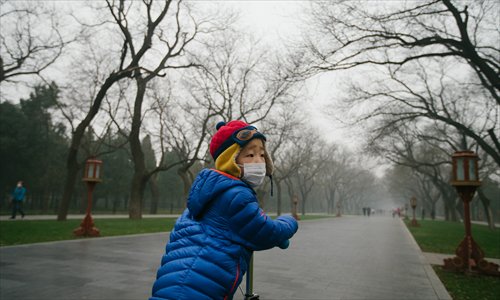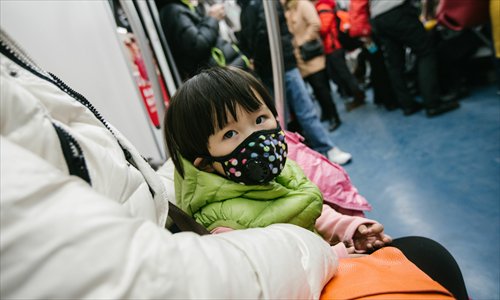All choked up
Beijing parents struggle to protect their children’s health on smoggy days
Liu Wei, the mother of a 6-year-old boy in Beijing, has been increasingly concerned about her son's health since heavy air pollution has been hitting Beijing one after another recently. Last week, the city was on red alert due to air pollution, and her son's primary school was out for two days. Since she had to work, her son was home alone.
"The first domestic appliance my husband and I taught our son to use was our air purifier, for we think it is much more important than the others under the current circumstance," said Liu.
On December 8, Beijing for the first time issued a red alert for air pollution, the highest of four levels, according to the Xinhua News Agency. The odd-and-even number license plate rule was carried out for two days, and kindergarten, primary and middle schools and other educational institutions were ordered to suspend class.
To protect their children, parents have taken all kinds of measures to keep their children safe.

More parents in Beijing are increasingly worried about their children's health on smog-filled days. Photo: Li Hao/GT
The cost of staying home
Most students favor time off from school, but the "pollution vacation" seems to be more of a nuisance than a blessing for parents in Beijing. According to the China National Radio's website on December 9, about 70 percent of the 10,000 parents surveyed from all over China on the issue are not for suspending classes on smoggy days because they have a difficulty in looking after their children.
Liu is one of them. She has a dilemma. On one hand she worries about her son's health; on the other hand, she worries about his safety when he is at home alone. Also, the boy himself is not happy to be locked indoors. "He loves to play with his classmates outdoors and hopes to do that every day instead of doing homework at home, which makes him feel very lonely," said Liu.
"So I think suspending class is not an effective method, and we parents should turn to more intense protection for our children, and make sure their right to play and study are not deprived by the pollution."
Zhang Meng, the mother of a 7-year-old girl who is in the second grade of a primary school in Haidian district, has been watching the air quality for about a year since her daughter was enrolled in the school.
"If the air pollution index is over 300, I prevent my daughter from going school for there's no air purifier in their classroom, and I cannot allow my girl to breathe in the polluted air," said Zhang. She has been buying expensive masks for her daughter since December 1 when the heavy pollution hit Beijing.
Zhang is in a WeChat group for parents of children in her daughter's school; they have been discussing finding a more effective mask for their children. The parents listed more than 10 kinds of masks, researched their functions, and discussed them in the group. After days of analysis, they chose one that claims to be able to filter PM 1 and is sold for 250 yuan ($39). More than 10 parents, including Zhang, purchased the expensive masks for their children, along with dozens of filters. Each family spent more than 1,000 yuan on average.
"I think the expense is a must, for foggy days will be a common phenomenon in Beijing in the future," said Zhang. "I do not know whether the mask is as effective as its advertisement says, but we parents have to make perfect protection, maybe the most expensive protection for our children."

Most parents are willing to buy expensive apparatus, including masks and air purifiers, to protect their children from Beijing's heavy air pollution. Photo: Li Hao/GT
Struggle for air purifier
Learning from a friend that there are parents who had raised funds to buy an air purifier for their children's classrooms, Zhang thought it was a good idea and called on the parents of her daughter's classmates to buy one for their children.
"There are 44 students in my daughter's class. If each family pays about 300 yuan, we can afford a top level air purifier, which is sold for over 10,000 yuan," said Zhang. She has expressed her wish to the school that they will fund to buy an air purifier, but the decision has not been made by the school as yet due to safety concerns.
According to a December 9 report published by The Mirror, a Beijing local newspaper, many kindergartens and primary schools in Xicheng, Haidian, Dongcheng and Chaoyang districts have received requests from parents asking for an air purifier to be installed in their children's classrooms. However, experts said the effect may not be as satisfying as they imagined.
Chai Fahe, deputy head of the Chinese Research Academy of Environmental Sciences, said in the report that an air purifier should be used in a room where the doors and windows are shut tightly with little ventilation. However, there are many children in a classroom, and a closed environment is not good for children's health as it may increase the spread of disease-causing germs.
"If parents want to make the air in the classrooms cleaner, instead of air purifier, they can choose central ventilation system, which can both filter the dirty air outside and send fresh air to the classroom," suggested Chai.
The report also pointed out that some schools are afraid of possible safety issues associated with acquiring an air purifier, for example, electricity safety and radiation. An anonymous primary school headmaster in Haidian district told The Mirror that since last year he had received requests from eager parents asking for an air purifier, but he has not approved it.
"All the sockets for electrical appliances in our classrooms are specially made (tamper proof) sockets, but the socket for the air purifier is not, which creates a hazard of electric shock," said the headmaster. "After all, we have about 50 curious children in here."
The headmaster was also concerned about the potential exposure to radiation, product quality, and maintenance costs for the purifier.
Escaping the smog
Jennifer Crooks, a 35-year-old Australian, has been living in Beijing with her husband and son for about half a year. She had enrolled her son in a bilingual kindergarten near her workplace in Shunyi district. But four months ago, she took her four-year-old son back to Australia. Though reluctant to part with him, she has to, due to the air pollution.
"He coughs a lot and has stuffy and runny nose when he goes out on foggy days, and we have to keep him indoors, which makes him upset," said Crooks. "So I asked for a leave and took him back to our hometown. Work is important, but my son is the most important."
She said that on heavily polluted days before her son was sent to Australia, she kept him at home with the babysitter and two air purifiers on for the whole day. "If things go on like this, I'm afraid my son will be brought up by our illiterate babysitter," Crooks said. She plans to work harder and try to finish her job in China sooner so that she can reunite with her son.
More intense daily care
Both Liu and Zhang said they have increased the number of times they make their children wash their face, hands, and nose. They also wash their clothes more often to remove the PM 2.5 attached to the clothes and are continuously searching for new recipes that are said to be beneficial to the respiratory system for their children.
"I store pears, black fungus, and animal blood in my kitchen, which are all said to be good for human lungs. I make at least one of such 'lung cleaner' dishes each day," said Liu.
Zhang has taken her pursuit a little further. She developed many original recipes such as a fruit soup containing loquat, pear and orange cooked with crystal sugar, as well as pig blood soup cooked with radish and mushroom. She said she believes the food can help her daughter get rid of the PM 2.5 she has breathed in.
However, Shi Jie, a Beijing-based nutritionist, said that such foods and recipes are not that effective and parents should not panic and feed their children too much of such foods.
"A balanced diet is the most important in fighting against the air pollution. It can increase immunity in an all-round way," said Shi.
Shi suggested that children over the age of 1 drink about 350 milliliters of milk to supply enough protein and minerals, and if parents want to give their children vitamins, they should consult a doctor instead of blindly giving pills to the children.
"The air pollution is harmful," said Nan Yahua, a pediatrician at Peking University First Hospital. "But parents had better not complain about it all the time in front of their children, or they may develop a fear mentality."
Nan said parents should instead focus on helping children develop habits such as wearing a mask and keeping themselves clean. Also, when the air is clean, they should make their children do physical exercise to increase their lung's oxygen delivery capacity, their ability to adapt to the environment and resistance against diseases.